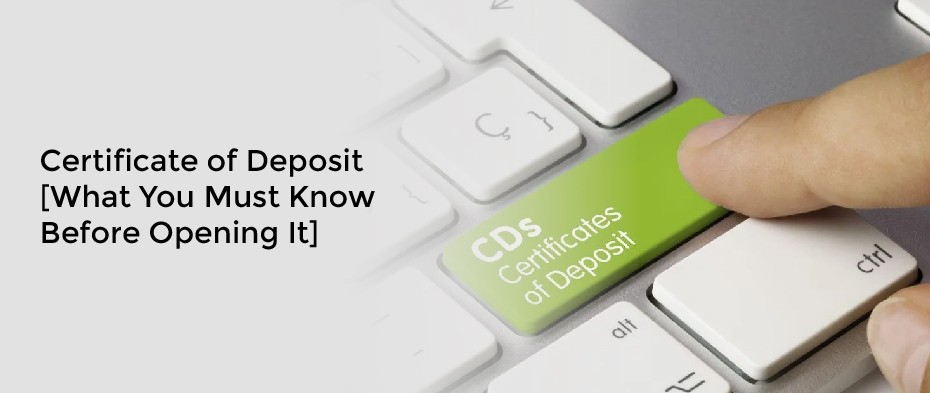A certificate of deposit is a financial product that enables you to save money for a specific period. It is commonly sold by banks, thrift institutions, and credit unions. Unlike savings accounts, which you can access whenever you want, a certificate of payment typically has a fixed interest rate and a set term.
What Is a Certificate of Deposit (CD)?
A certificate of deposit (CD) is a savings account that pays interest on your deposited funds. The interest rate is usually higher than that of a traditional savings account, and the account typically has a fixed term, such as six months, one year, or five years.
You can withdraw your money before the end of the term, but you will typically pay the penalty for doing so. Banks and credit unions offer CDs.
Why Should I Open A Certificate Of Deposit Rates?
A CD’s interest rate is often higher than the rate offered by most bank accounts and is a fixed, safe, and generally federally insured investment. When you are willing to deposit your money for longer, CD rates are generally higher.
CDs are a more attractive option for savers who do not want to take on the risk of market volatility or volatility associated with savings, checking, or money market accounts.
Frequent Understanding of Certificate of Deposit
1. Interest Rates
When it comes to Certificate of payment interest rates, there are a few factors you need to look for. First, you want to find a bank that offers you the highest rate of return. You should also check with experts who can advise you on the best way to invest your money. A document of Deposit is an agreement with a bank wherein you deposit a certain amount. And they will pay you interest over a specific period. You can even negotiate the terms of your investment.
When you compare CD rates, you will find that credit unions and online-only banks are generally able to offer higher rates than national banks. While this is true, rates are not likely to go much higher in the future, particularly in the case of online banks that are trying to compete with big banks. For example, American First Credit Union is offering 3.50% interest on a 12-month CD, which is higher than the national average of 3.25%.
2. Minimum Deposit Requirements
Before opening a certificate of deposit, you need to determine the minimum deposit required by the bank or financial institution. Most financial institutions have a minimum balance requirement of $50 or $100, but some don’t require a minimum amount. If your bank does require a minimum balance requirement, you may be able to meet the minimum amount with a transfer from another financial institution, a check, or money order. If the bank or financial institution doesn’t have a minimum balance requirement, you can make more than the minimum amount.
CDs are considered safe investments, but not all banks have the same minimum deposit requirements. This is a matter of bank policy rather than federal regulations. Most CDs are insured by the FDIC for up to $250,000, making them a relatively low-risk investment. However, some banks allow you to open a CD with no deposit requirement. But you’ll probably pay the penalty if you withdraw your money early.
3. Tax Implications
Before making a CD investment, it is important to understand the tax implications. Your interest in a CD is subject to federal and state income taxes. These taxes are calculated according to your income tax bracket and inflation rate. As a result, you must report the interest you earn on a CD to the IRS. However, your interest in a CD may not keep up with inflation.
The interest you earn on a CD is taxable if it exceeds the amount you paid. However, if you withdraw money from your CD early, the interest earned is deductible from your taxes. The tax deadline for CD withdrawals varies, and penalties for early withdrawals may be deductible.
4. Compounding Investment
If you’ve ever invested in a certificate of deposit, you’re probably aware that the interest you earn is compounded over time. This means that interest on your money grows faster each year, which can be used to maximize your earnings and minimize debt. Whether you’re considering a certificate of payment. Or a savings account, you’ll want to understand how compounding works and its benefits.
A record of the deposit is an investment product issued by banks, credit unions, and other financial institutions. This is a type of savings account, except that investors lock in their funds for a specific period. This investment earns a higher interest rate because the interest compounded daily is reinvested. This means that a $5,000 CD can earn Joe $1382 in five years, which is more than double his initial investment.
Conclusion
A certificate of deposit, or CD, is a type of savings account that typically offers a higher interest rate than a traditional one. Banks and credit unions offer CDs and typically have terms ranging from six months to five years.
A CD could be a good option if you’re looking for a safe place to invest your money. Be sure to compare interest rates and terms from different banks before opening a CD account.



